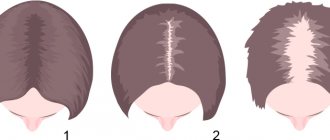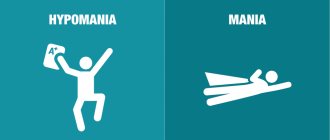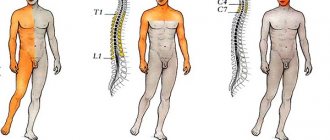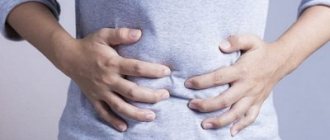Nutrition and lifestyle are important, but only provoking factors. And then standard treatment from a gastroenterologist helps only for a while , until the next exacerbation. A completely different result if the nervous system finally “remembered” the digestive tract. Your own digestive control system is restored and the need for constant treatment gradually disappears. The nervous system here is not only the cause of the disease, but also a convenient treatment tool.
- Often problems with the gastrointestinal tract begin with a disorder of the nervous system
- What does the effect of nervous tension on digestion look like in practice?
- Psychotherapy and hypnosis - treatment whose results are always with you
- What and how we treat. How to contact the Clinic
- More about diseases
What else is dangerous about severe stress?
It is worth knowing that it is considered one of the triggering factors for the development of Irritable Bowel Syndrome2.
Irritable bowel syndrome (IBS) is one of the most common intestinal diseases3, the main manifestations of which5 are:
- pain and cramping in the abdomen
- bowel dysfunction (diarrhea and/or constipation);
- bloating, flatulence.
IBS refers to functional disorders of the intestine. What does it mean? In a healthy state, the intestines (or, more precisely, their walls) contract and ensure the passage of food. With IBS, the rhythm of contractions of the intestinal walls is disrupted, that is, its motor function is impaired.
Signs of Irritable Bowel Syndrome
Impaired motility (motor activity of the intestines):
Constipation occurs when motor skills are slow. The intestinal walls become less active and cannot provide the necessary movement of intestinal contents. Constipation is often accompanied by increased gas formation. Due to retention of contents in the intestines, fermentation processes intensify, gases accumulate - flatulence occurs.
Diarrhea occurs when intestinal motility increases. The intestinal walls begin to contract intensely, causing the intestinal contents to move along too quickly.
Spasm of intestinal smooth muscles leads to a feeling of abdominal pain and can also provoke the development of constipation.
Digestive disorders (nutrient absorption).
This or that disruption of the intestines affects the absorption of nutrients that we get from food. With constipation, bowel cleansing is delayed. This leads to the fact that harmful substances formed during digestion remain in the intestines longer than necessary and begin to be absorbed into the blood, causing intoxication. With diarrhea, on the contrary, the food in the intestines does not have time to be fully digested, and liquid and nutrients substances do not have time to enter the body.
What and how we treat
Our task is to help you in any accessible and safe way. Psychotherapy (hypnosis) is an obligatory component of therapy, and psychotherapists and gastroenterologists are specialists carrying out the treatment process.
How many hypnosis sessions are needed? Usually the first results can be seen after the first or second sessions. The general course averages 7 sessions 1-2 times a week.
Do you need a gastroenterologist? If digestion is impaired, there is an active inflammatory process, stomach or duodenal ulcers, a gastroenterologist is definitely needed.
How to soothe irritable bowel?
In order to restore intestinal function, it is necessary to stabilize the psycho-emotional state and learn to manage stress5.
Simple habits will help you maintain emotional balance, avoid the negative effects of stress and restore strength faster6:
- The right balance between work and rest
- Regular meals in small portions several times a day
- Proper breathing and aromatherapy
- Sports activities, walking outdoors
- Periodic change of environment
- Creative hobbies
In case of chronic stress and the impossibility of following the above recommendations, sedatives and consultations with a psychologist or psychotherapist may be required. Often, various psychotherapeutic interventions are used as treatment methods for Irritable Bowel Syndrome. When used skillfully, these methods help reduce anxiety and improve mood, which has a positive effect on health.
Emotional recovery can take a long time, and the unpleasant symptoms of IBS can continue to disrupt the usual rhythm of life. This is why treating the symptoms of Irritable Bowel Syndrome is equally important.
Duspatalin® 135 mg is indicated specifically for the treatment of pain, cramping and intestinal discomfort associated with Irritable Bowel Syndrome4.
Often problems with the gastrointestinal tract begin with a disorder of the nervous system
Here is a typical situation: two people eat the same thing, but one is completely healthy, and the other has a duodenal ulcer and Helicobacter pylori infection. Why is that? It turns out that diseases of the digestive system almost always begin with a nervous disorder.
The famous pathophysiologist Hans Selye created long-term stressful nervous tension in healthy rats in various ways and always received ulcers of the digestive tract . Roughly speaking, the nervous system simply “forgot” to control digestion during stress. This happened under stress of absolutely any nature (mental, temperature, traumatic stress, etc.).
Duspatalin® 135 mg has a dual effect against the symptoms of IBS4:
- relieves spasms and pain in the abdomen, the drug begins to develop its effect within 15 minutes6;
- normalizes intestinal function, eliminating diarrhea, constipation, bloating and flatulence7.
The drug Duspatalin® 135 mg acts directly at the site of the problem - the intestines4, unlike systemic drugs, does not disrupt the functions of other organs and systems4.
Here you can familiarize yourself in detail with the drug Duspatalin® 135 mg and instructions for medical use.
Co-author of articles, editor - Shimbaretsky Georgy Alekseevich.
Stomach hurts from nerves: what to do if your stomach hurts after stress
Stomach hurts from nerves: what to do if your stomach hurts after stress
Each person's nervous system can react differently to external influences. Therefore, in some people, abdominal pain associated with psycho-emotional shock may occur instantly, in others - only after a long period of experiences, and in others - it may not occur at all. The appearance of pain in the abdomen after stress is a signal that you should undergo an examination and, if necessary, take action. After all, chronic psycho-emotional stress can lead to more serious health problems, such as gastritis or stomach ulcers. You should immediately consult a doctor and under no circumstances self-medicate.
The effect of stress on the stomach
How does stomach pain occur after stress? The mechanism of its development is based on a violation of nervous regulation. Stress stimulates excessive production of catecholamines - biologically active substances that enter the blood as a response to physical or psycho-emotional stress. The most famous of them are adrenaline and norepinephrine. These hormones help reduce the production of mucus, which helps protect the stomach from the negative effects of microorganisms, pepsin and hydrochloric acid. By affecting the central nervous system, they can disrupt the motility of the digestive system and impair its blood circulation. Thus, stress can lead to inhibition of peristalsis and activation of aggressive factors (high concentrations of hydrochloric acid, increased production of pepsin, as well as the proliferation of helicobacter pylori bacteria). As a result, damage to the mucous membrane often occurs, inflammation develops, and with it pain appears.
Causes of stomach pain during and after stress
· Pathogenesis factors
Impaired contractility of the smooth muscles of the stomach. Catecholamines, particularly adrenaline, affect motor function and can cause painful spasms.
Increased production of hydrochloric acid . An increase in the acidity level of gastric juice and a simultaneous deterioration in mucus production can lead to damage to the inner lining of the stomach, its inflammation and pain.
Increased activity of helicobacter pylori. They can change the acidity of the environment around them and provoke increased synthesis of hydrochloric acid. Over time, this can lead to the development of chronic gastritis.
· Organic diseases
Nervous gastritis. It involves inflammation of the gastric mucosa. A distinctive sign of pathology against the background of stress is the appearance of pain exclusively at the moment of strong psycho-emotional experiences. Gastritis may be accompanied by increased anxiety, apathy, and severe heartburn. At any other time, the symptoms of the disease usually do not bother the patient.
Stomach ulcer. This is damage to the mucous membrane and the appearance of erosions on it. This condition can be caused by weakened immunity in combination with aggressive factors: actively reproducing helicobacter pylori bacteria, increased concentrations of hydrochloric acid and certain enzymes. Adrenal hormones, which are produced in large quantities during stress, help inhibit regeneration processes, impair blood microcirculation and trophism. Therefore, the ulcer cannot heal on its own. The main symptoms of the pathology are acute pain in the stomach, depression, and with gastric bleeding, which is a complication of a peptic ulcer, the patient often vomits.
· Inorganic diseases
Gastric neurosis (functional dyspepsia). The symptoms are similar to nervous digestive disorders, but there are still some differences. Usually the patient’s general well-being suffers and his appetite worsens. Nausea, heaviness, heartburn, belching, vomiting, painful abdominal cramps and a burning sensation often appear, regardless of whether the person has eaten or not.
Diagnostics
First, the doctor interviews the patient, finds out the accompanying symptoms, palpates the abdomen, during which he determines the tension of the abdominal muscles and clarifies the location of the pain. After this, the specialist usually refers the patient for additional examinations. These include the following:
· fibrogastroduodenoscopy with sampling of gastric juice and tissue biopsy;
· general and biochemical blood test;
· scatology and bacteriological examination of feces;
· Ultrasound of the abdominal organs;
· Helicobacter pylori test;
· radiography.
Very often, the therapist recommends consulting a gastroenterologist and psychotherapist.
Treatment
Physiotherapy. In addition to drug treatment, physiotherapy and spa vacations can help relieve painful spasms and calm the nervous system. The doctor selects physiotherapeutic procedures on an individual basis. Most often prescribed:
· hydrotherapy,
· general massage,
magnetic therapy,
ultraphonophoresis,
· Exercise therapy,
· darsonvalization.
Diet. When preparing your diet and consuming food, you should adhere to the following rules:
· exclude fried foods, fatty and spicy foods, as well as canned food and carbonated drinks;
· refuse products that cause irritation of the mucous membrane (seasonings, salty, sour foods) or provoke fermentation processes;
· give preference to boiled or steamed dishes;
· eat small meals (about 5-6 times a day), the portions themselves should be small;
· do not swallow food in large pieces;
· eat no later than three hours before bedtime.
The diet itself should be balanced, and foods rich in vitamins and minerals.
Therapy. Often, as part of complex therapy, doctors recommend taking medications whose action is aimed at combating the bacterium helicobacter pylori (eradication therapy). The main groups of drugs that can also be prescribed to patients with complaints of stomach pain due to stress include:
· antispasmodics (help relieve pain);
· proton pump inhibitors (aimed at reducing the level of hydrochloric acid);
· Antacids (help neutralize hydrochloric acid and thereby help eliminate heartburn).
However, in addition to symptomatic therapy, it is necessary to eliminate the very cause of the disease. To do this, a specialist may prescribe medications that can help cope with stress. These include sedatives, nootropics, antipsychotics, antidepressants, etc. The choice of a particular one is determined by the nature of the disorder caused (anxiety, depression, vegetative-vascular dystonia, hypochondria, etc.). It is worth noting that most of the medications have a sufficient number of side effects, so medications are prescribed only by a specialist and taken under the strict supervision of a doctor.
_________________________________________________________________________________________
Important
If the doctor has determined that stress has caused any disorders that are mild in nature, it may be advisable to take medications that have a mild and general effect. One of these is the herbal preparation Corvalol PHYTO . This is a combined remedy, the effect of which is due to its calming effect, as well as the ability to reduce spasms. It contains motherwort extract, peppermint oil and ethyl bromizovalerianate. The product is available in both tablets and drops.1
_________________________________________________________________________________________
In order to quickly get rid of abdominal pain caused by stress, you need not only to be examined in a timely manner and follow all the doctor’s instructions. The patient’s approach to the problem and his willingness to change his lifestyle play a big role. Experts recommend that such people relax more, walk in the fresh air, and play sports. Good results in the fight against stress can be achieved by finding a hobby. A favorite activity can distract you from problems and calm you down.
____________________
1 According to the instructions for medical use of the drug Corvalol PHYTO.










